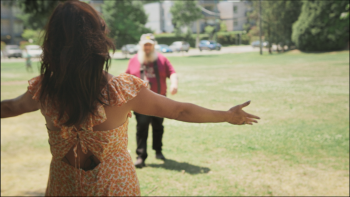Image Caption
Local Journalism Initiative Reporter
Windspeaker.com
Kristal Parke’s journey to find her home, where she truly belongs, is featured in the documentary Because She’s Adopted, which will screen at the Dreamspeakers International Indigenous Film Festival at the Metro Cinema in Edmonton on April 28 at 1:30 p.m.
It will also be streamed online April 29 through May 6 on the Dreamspeakers website www.dreamspeakers.org
“I’m really excited, I’ve never been to a film festival so I’m pretty pumped,” said Parke, adding she is travelling from the west coast to attend the event.
Because She’s Adopted is the first film the 40-year-old has ever made. It’s the first time she has ever produced a film. And it’s the very first project that publicly shares her story and struggles as an Indigenous adoptee.
From heartaches to heartfelt encounters, the documentary reveals the strong feelings that Indigenous children carry throughout their lives, the need to find their homes.
“I think it’s how you perceive belonging, you know, because I think, for me, I get to choose where I belong,” she said.
“I grew up feeling incredibly different from my adopted family because they’re Norwegian, right? Like they weren’t Indigenous. They were light skinned and I was kind of tanned. I just really did not feel like I belonged.”
She explained how even her personality didn’t match. Parke was very musical and no one in her adoptive family shared that passion.
“So, for me, I really had this belief that I was unwanted, unloved, that I was different and that I just didn’t belong. And, so, that belief sort of created my reality,” she said.
At 17 years old, Parke was reconnected with her biological mother and the person who was believed to be her biological father.
The documentary captures the emotional meeting with her mother and follows Parke as she meets her community at the Opaskwayak Cree Nation in Manitoba.
Parke shares the internal struggles that a child has being raised outside of the community by non-Indigenous people and the fear that they won’t be accepted by their biological relations.
“I felt so displaced from the Indigenous community, from Indigenous people, because I was assimilated 100 per cent. For me to be able to drop into that community, I felt like they were just going to reject me because they would see that assimilation all over me,” Parke explained.
But the reality of that meeting was the complete opposite.
“When I got there, I was considered one of the lost children that had been found, because of the residential school, the Sixties Scoop… And they just embraced me, declared me a member right then.”
As Parke recalls the meeting all that long time ago, her voice still quivers with emotion, because in that moment all the hardships she had as a child, of not belonging, were now overcome by immense welcoming.
“And so, definitely, I felt a deep sense of belonging there for sure,” she said.
But her journey was just beginning.
To find more information and connections about her story, three years ago Parke completed a public forum DNA test.
The results showed her paternity matched a man who was not the same person that for 20 years she had been told was her biological father.
Because She’s Adopted opens with clips from the first conversation she had with her actual biological father.
“(I) was like ‘who is this person’?” Parke said. “But, when I found him on AncestryDNA, I sent him a message and said ‘Hey, I’m not sure if you noticed, but we have a match. And it turns out that I’m your daughter.”
Truth was, he hadn’t any clue about her, but he wrote back to Parke the very next day.
“I had no idea you existed. I am so proud to be your father and I am so proud that you’re my daughter and I’m going to say the three most powerful words anyone can say to another person, which is ‘I love you’,” was the message Parke received from him.
The two met one day in a park, and he just happened to bring his guitar, a full circle moment for Parke as she finally was able to place what her spirit always knew.
“God knew exactly what I needed in those moments to heal those pieces of my heart that had been broken for all those years, and he used this very simple, genuine, unique individual who just so happened to be my father to do that,” she said.
All the rage, anger, hurt, sorrow, brokenness left Parke that day, she said.
“I struggled with rage for most of my life and after I did this, the journey, and found my father, the rage kind of left me,” Parke said.
Capturing her story of being an adoptee, meeting her biological family, her community and sharing it in her documentary has demonstrated to Parke there are many others like her.
"For an adoptee it’s hard because you feel like you’re caught between two worlds. You don’t always feel like you belong completely to your adoptive family, but then even when you do find your biological family you might not feel like you completely belong to them either,” she said. “For me, being an adopted person can be a very lonely existence in that liminal space.”
But taking those feelings and sharing them through question-and-answer periods after screenings of her film with other families affected by adoption has been “very impactful” for her and for the individuals in attendance.
Parke will soon release a six-part podcast that will dive deeper into the details of her story.
For more information or to purchase tickets for the Dreamspeakers International Indigenous Film Festival visit www.dreamspeakers.org/diiff-2024 .
Local Journalism Initiative Reporters are supported by a financial contribution made by the Government of Canada.

